Economic Analysis: Fiscal, Monetary Policies and Managerial Decisions
VerifiedAdded on 2020/05/03
|6
|1048
|38
Homework Assignment
AI Summary
This economics assignment analyzes the impact of government policies on the economy, focusing on fiscal and monetary strategies. Part 1 examines the argument for and against a sugar tax in Australia, discussing its potential health and economic benefits, alongside counterarguments regarding inelastic demand. Part II delves into Keynesian economics, explaining the demand-side policy and the role of government intervention during recessions. It further explores automatic stabilizers and discretionary fiscal policies, evaluating their effects on budget deficits and macroeconomic performance. The assignment also assesses the effectiveness of monetary policy as an economic stimulus, comparing it with fiscal policy and addressing the challenges of timing and implementation.
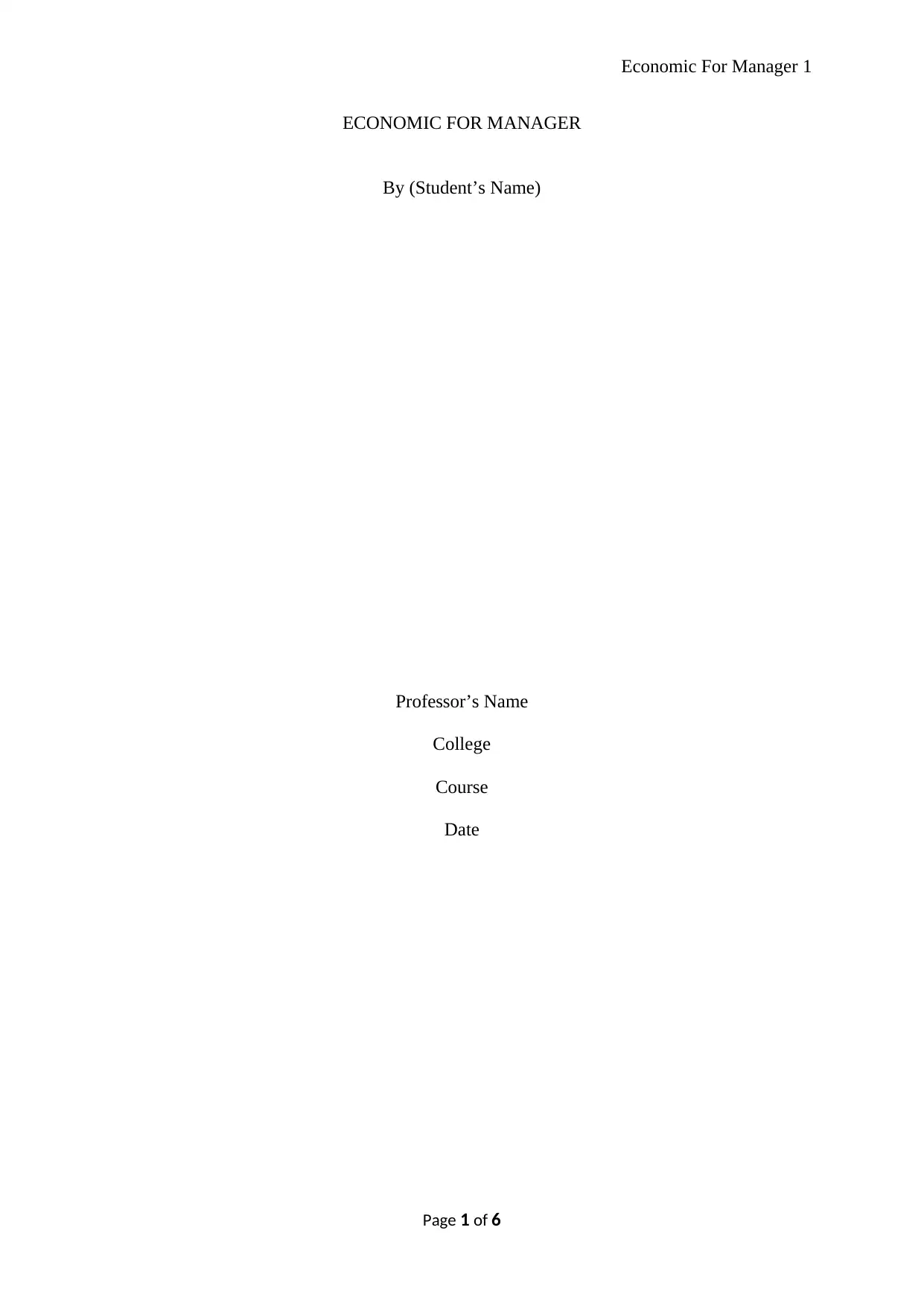
Economic For Manager 1
ECONOMIC FOR MANAGER
By (Student’s Name)
Professor’s Name
College
Course
Date
Page 1 of 6
ECONOMIC FOR MANAGER
By (Student’s Name)
Professor’s Name
College
Course
Date
Page 1 of 6
Paraphrase This Document
Need a fresh take? Get an instant paraphrase of this document with our AI Paraphraser
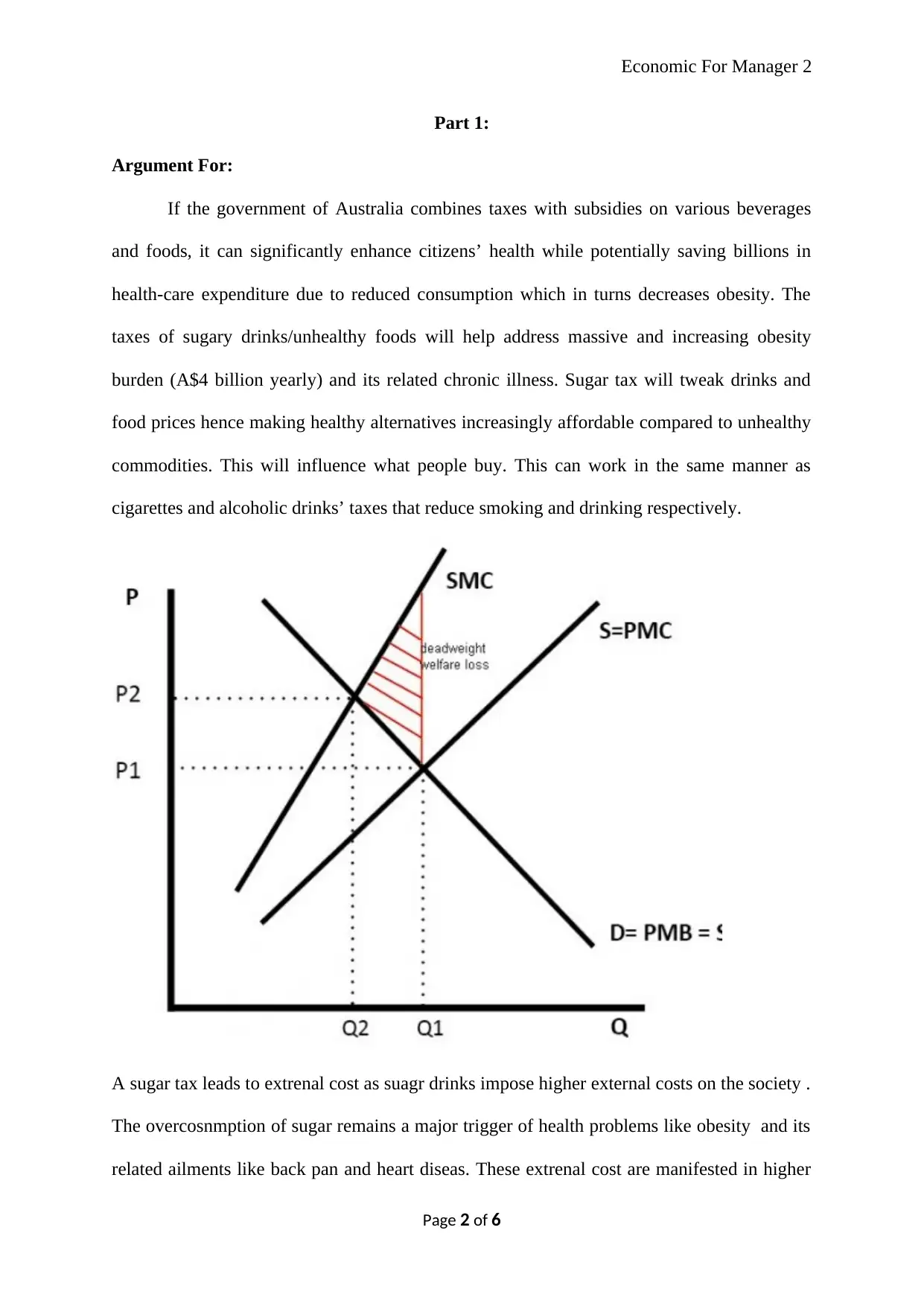
Economic For Manager 2
Part 1:
Argument For:
If the government of Australia combines taxes with subsidies on various beverages
and foods, it can significantly enhance citizens’ health while potentially saving billions in
health-care expenditure due to reduced consumption which in turns decreases obesity. The
taxes of sugary drinks/unhealthy foods will help address massive and increasing obesity
burden (A$4 billion yearly) and its related chronic illness. Sugar tax will tweak drinks and
food prices hence making healthy alternatives increasingly affordable compared to unhealthy
commodities. This will influence what people buy. This can work in the same manner as
cigarettes and alcoholic drinks’ taxes that reduce smoking and drinking respectively.
A sugar tax leads to extrenal cost as suagr drinks impose higher external costs on the society .
The overcosnmption of sugar remains a major trigger of health problems like obesity and its
related ailments like back pan and heart diseas. These extrenal cost are manifested in higher
Page 2 of 6
Part 1:
Argument For:
If the government of Australia combines taxes with subsidies on various beverages
and foods, it can significantly enhance citizens’ health while potentially saving billions in
health-care expenditure due to reduced consumption which in turns decreases obesity. The
taxes of sugary drinks/unhealthy foods will help address massive and increasing obesity
burden (A$4 billion yearly) and its related chronic illness. Sugar tax will tweak drinks and
food prices hence making healthy alternatives increasingly affordable compared to unhealthy
commodities. This will influence what people buy. This can work in the same manner as
cigarettes and alcoholic drinks’ taxes that reduce smoking and drinking respectively.
A sugar tax leads to extrenal cost as suagr drinks impose higher external costs on the society .
The overcosnmption of sugar remains a major trigger of health problems like obesity and its
related ailments like back pan and heart diseas. These extrenal cost are manifested in higher
Page 2 of 6
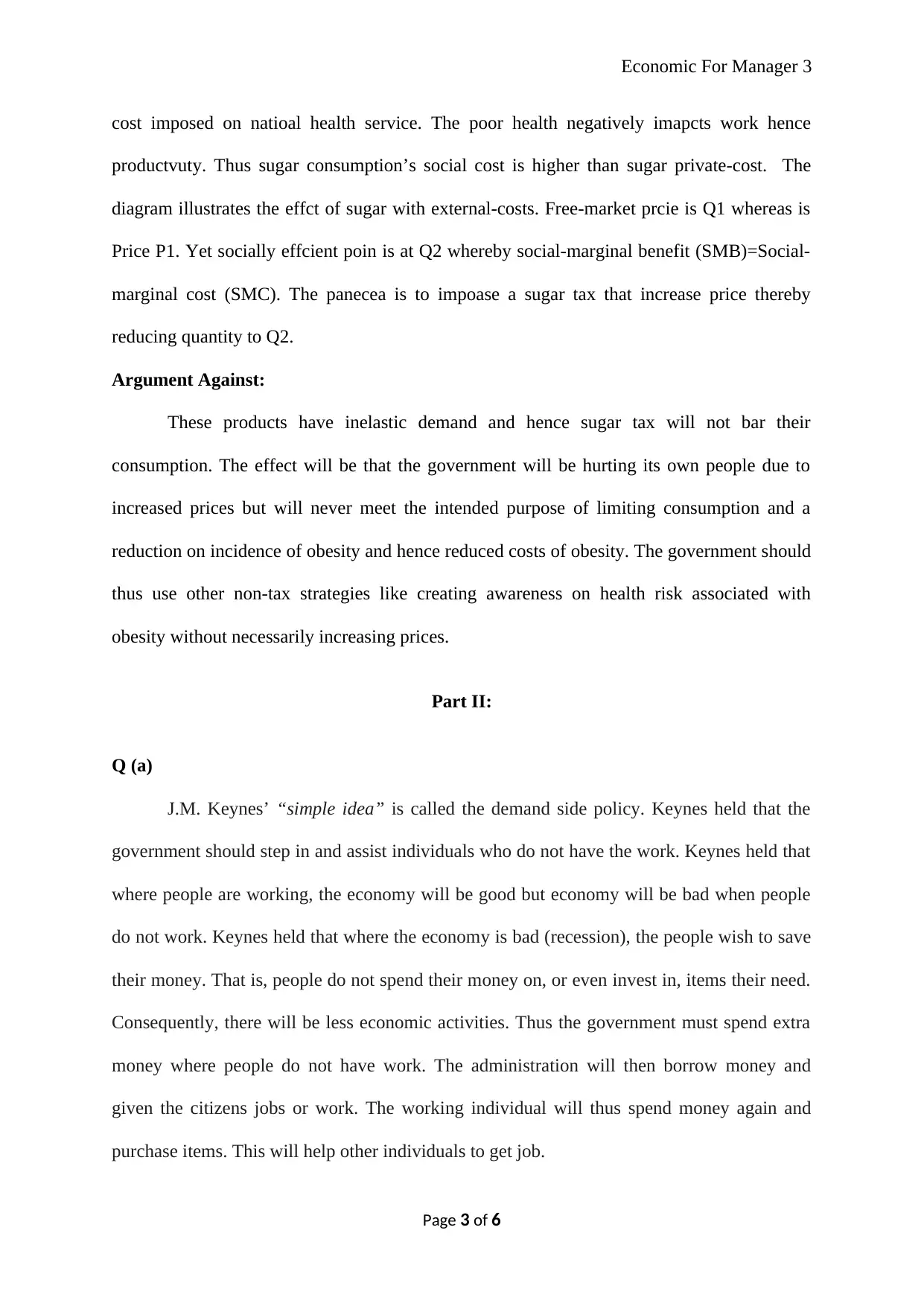
Economic For Manager 3
cost imposed on natioal health service. The poor health negatively imapcts work hence
productvuty. Thus sugar consumption’s social cost is higher than sugar private-cost. The
diagram illustrates the effct of sugar with external-costs. Free-market prcie is Q1 whereas is
Price P1. Yet socially effcient poin is at Q2 whereby social-marginal benefit (SMB)=Social-
marginal cost (SMC). The panecea is to impoase a sugar tax that increase price thereby
reducing quantity to Q2.
Argument Against:
These products have inelastic demand and hence sugar tax will not bar their
consumption. The effect will be that the government will be hurting its own people due to
increased prices but will never meet the intended purpose of limiting consumption and a
reduction on incidence of obesity and hence reduced costs of obesity. The government should
thus use other non-tax strategies like creating awareness on health risk associated with
obesity without necessarily increasing prices.
Part II:
Q (a)
J.M. Keynes’ “simple idea” is called the demand side policy. Keynes held that the
government should step in and assist individuals who do not have the work. Keynes held that
where people are working, the economy will be good but economy will be bad when people
do not work. Keynes held that where the economy is bad (recession), the people wish to save
their money. That is, people do not spend their money on, or even invest in, items their need.
Consequently, there will be less economic activities. Thus the government must spend extra
money where people do not have work. The administration will then borrow money and
given the citizens jobs or work. The working individual will thus spend money again and
purchase items. This will help other individuals to get job.
Page 3 of 6
cost imposed on natioal health service. The poor health negatively imapcts work hence
productvuty. Thus sugar consumption’s social cost is higher than sugar private-cost. The
diagram illustrates the effct of sugar with external-costs. Free-market prcie is Q1 whereas is
Price P1. Yet socially effcient poin is at Q2 whereby social-marginal benefit (SMB)=Social-
marginal cost (SMC). The panecea is to impoase a sugar tax that increase price thereby
reducing quantity to Q2.
Argument Against:
These products have inelastic demand and hence sugar tax will not bar their
consumption. The effect will be that the government will be hurting its own people due to
increased prices but will never meet the intended purpose of limiting consumption and a
reduction on incidence of obesity and hence reduced costs of obesity. The government should
thus use other non-tax strategies like creating awareness on health risk associated with
obesity without necessarily increasing prices.
Part II:
Q (a)
J.M. Keynes’ “simple idea” is called the demand side policy. Keynes held that the
government should step in and assist individuals who do not have the work. Keynes held that
where people are working, the economy will be good but economy will be bad when people
do not work. Keynes held that where the economy is bad (recession), the people wish to save
their money. That is, people do not spend their money on, or even invest in, items their need.
Consequently, there will be less economic activities. Thus the government must spend extra
money where people do not have work. The administration will then borrow money and
given the citizens jobs or work. The working individual will thus spend money again and
purchase items. This will help other individuals to get job.
Page 3 of 6
⊘ This is a preview!⊘
Do you want full access?
Subscribe today to unlock all pages.

Trusted by 1+ million students worldwide
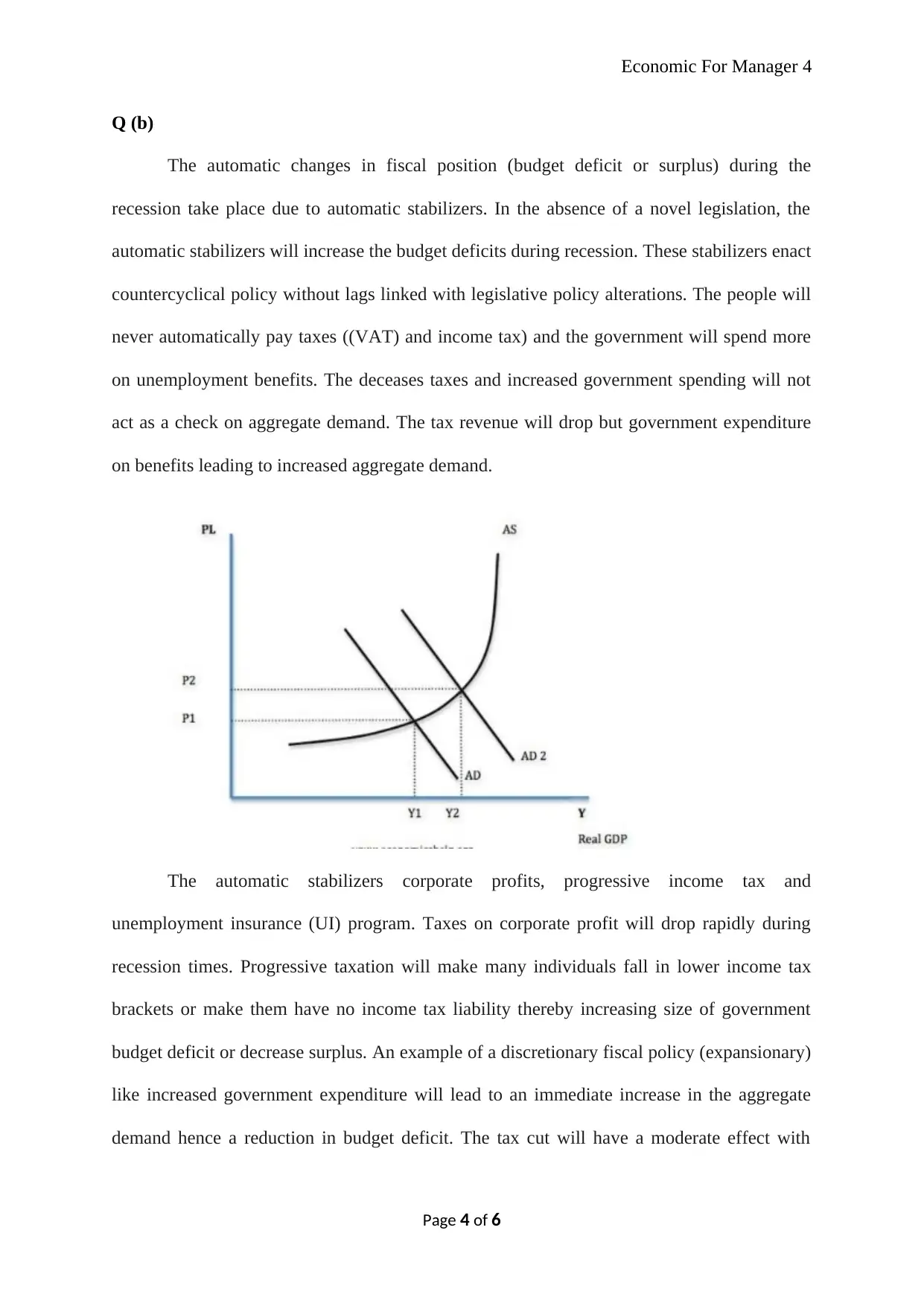
Economic For Manager 4
Q (b)
The automatic changes in fiscal position (budget deficit or surplus) during the
recession take place due to automatic stabilizers. In the absence of a novel legislation, the
automatic stabilizers will increase the budget deficits during recession. These stabilizers enact
countercyclical policy without lags linked with legislative policy alterations. The people will
never automatically pay taxes ((VAT) and income tax) and the government will spend more
on unemployment benefits. The deceases taxes and increased government spending will not
act as a check on aggregate demand. The tax revenue will drop but government expenditure
on benefits leading to increased aggregate demand.
The automatic stabilizers corporate profits, progressive income tax and
unemployment insurance (UI) program. Taxes on corporate profit will drop rapidly during
recession times. Progressive taxation will make many individuals fall in lower income tax
brackets or make them have no income tax liability thereby increasing size of government
budget deficit or decrease surplus. An example of a discretionary fiscal policy (expansionary)
like increased government expenditure will lead to an immediate increase in the aggregate
demand hence a reduction in budget deficit. The tax cut will have a moderate effect with
Page 4 of 6
Q (b)
The automatic changes in fiscal position (budget deficit or surplus) during the
recession take place due to automatic stabilizers. In the absence of a novel legislation, the
automatic stabilizers will increase the budget deficits during recession. These stabilizers enact
countercyclical policy without lags linked with legislative policy alterations. The people will
never automatically pay taxes ((VAT) and income tax) and the government will spend more
on unemployment benefits. The deceases taxes and increased government spending will not
act as a check on aggregate demand. The tax revenue will drop but government expenditure
on benefits leading to increased aggregate demand.
The automatic stabilizers corporate profits, progressive income tax and
unemployment insurance (UI) program. Taxes on corporate profit will drop rapidly during
recession times. Progressive taxation will make many individuals fall in lower income tax
brackets or make them have no income tax liability thereby increasing size of government
budget deficit or decrease surplus. An example of a discretionary fiscal policy (expansionary)
like increased government expenditure will lead to an immediate increase in the aggregate
demand hence a reduction in budget deficit. The tax cut will have a moderate effect with
Page 4 of 6
Paraphrase This Document
Need a fresh take? Get an instant paraphrase of this document with our AI Paraphraser
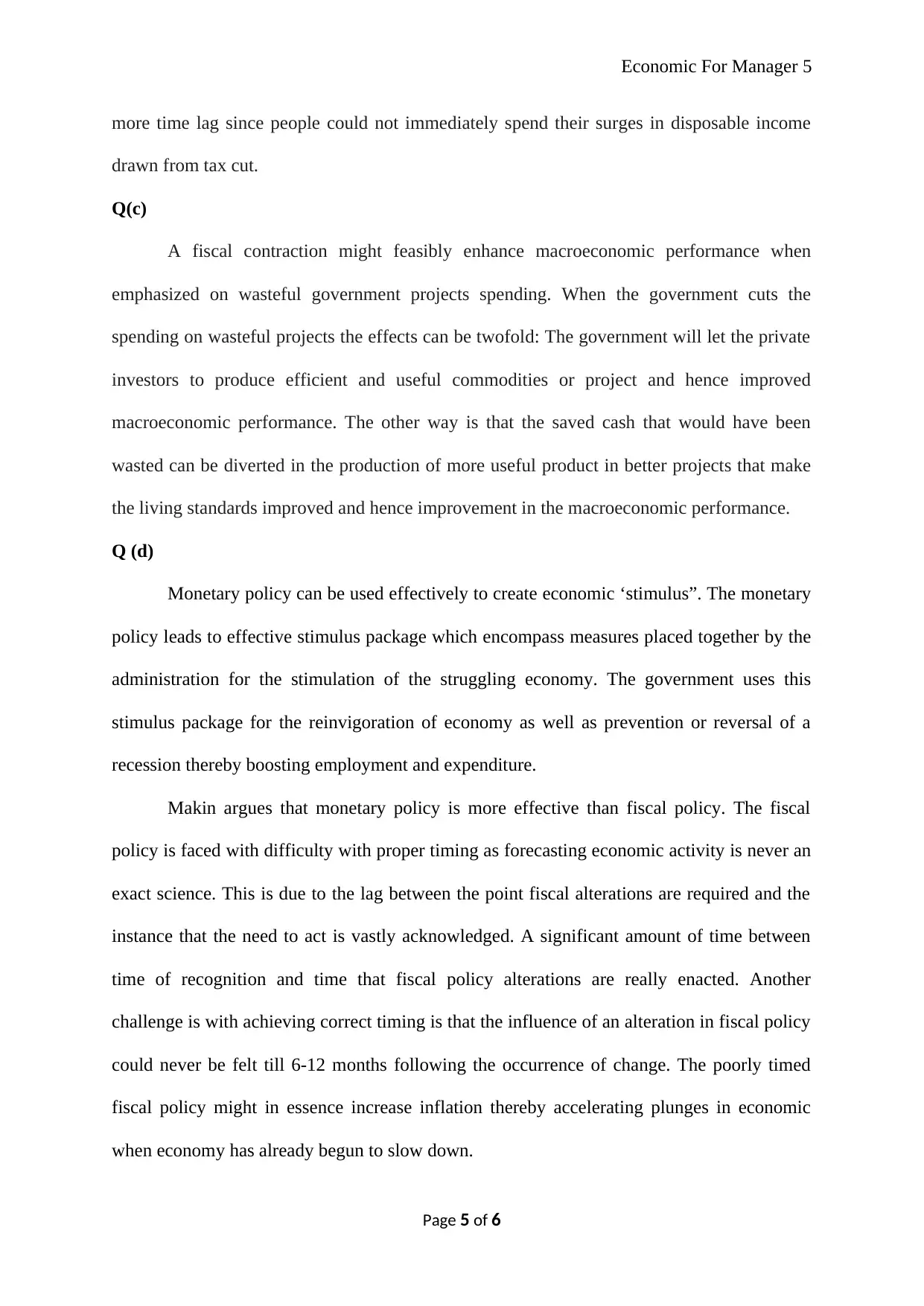
Economic For Manager 5
more time lag since people could not immediately spend their surges in disposable income
drawn from tax cut.
Q(c)
A fiscal contraction might feasibly enhance macroeconomic performance when
emphasized on wasteful government projects spending. When the government cuts the
spending on wasteful projects the effects can be twofold: The government will let the private
investors to produce efficient and useful commodities or project and hence improved
macroeconomic performance. The other way is that the saved cash that would have been
wasted can be diverted in the production of more useful product in better projects that make
the living standards improved and hence improvement in the macroeconomic performance.
Q (d)
Monetary policy can be used effectively to create economic ‘stimulus”. The monetary
policy leads to effective stimulus package which encompass measures placed together by the
administration for the stimulation of the struggling economy. The government uses this
stimulus package for the reinvigoration of economy as well as prevention or reversal of a
recession thereby boosting employment and expenditure.
Makin argues that monetary policy is more effective than fiscal policy. The fiscal
policy is faced with difficulty with proper timing as forecasting economic activity is never an
exact science. This is due to the lag between the point fiscal alterations are required and the
instance that the need to act is vastly acknowledged. A significant amount of time between
time of recognition and time that fiscal policy alterations are really enacted. Another
challenge is with achieving correct timing is that the influence of an alteration in fiscal policy
could never be felt till 6-12 months following the occurrence of change. The poorly timed
fiscal policy might in essence increase inflation thereby accelerating plunges in economic
when economy has already begun to slow down.
Page 5 of 6
more time lag since people could not immediately spend their surges in disposable income
drawn from tax cut.
Q(c)
A fiscal contraction might feasibly enhance macroeconomic performance when
emphasized on wasteful government projects spending. When the government cuts the
spending on wasteful projects the effects can be twofold: The government will let the private
investors to produce efficient and useful commodities or project and hence improved
macroeconomic performance. The other way is that the saved cash that would have been
wasted can be diverted in the production of more useful product in better projects that make
the living standards improved and hence improvement in the macroeconomic performance.
Q (d)
Monetary policy can be used effectively to create economic ‘stimulus”. The monetary
policy leads to effective stimulus package which encompass measures placed together by the
administration for the stimulation of the struggling economy. The government uses this
stimulus package for the reinvigoration of economy as well as prevention or reversal of a
recession thereby boosting employment and expenditure.
Makin argues that monetary policy is more effective than fiscal policy. The fiscal
policy is faced with difficulty with proper timing as forecasting economic activity is never an
exact science. This is due to the lag between the point fiscal alterations are required and the
instance that the need to act is vastly acknowledged. A significant amount of time between
time of recognition and time that fiscal policy alterations are really enacted. Another
challenge is with achieving correct timing is that the influence of an alteration in fiscal policy
could never be felt till 6-12 months following the occurrence of change. The poorly timed
fiscal policy might in essence increase inflation thereby accelerating plunges in economic
when economy has already begun to slow down.
Page 5 of 6
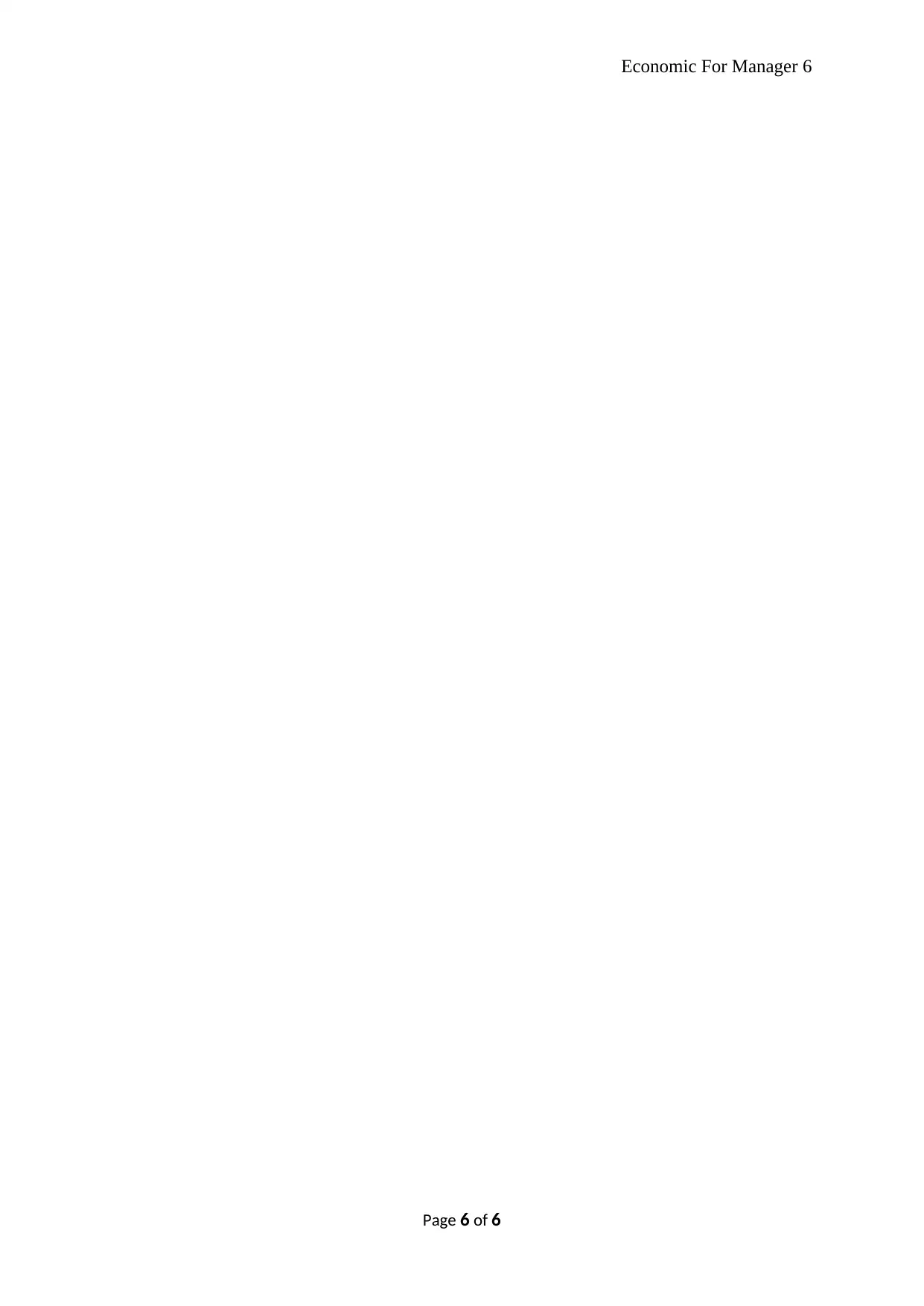
Economic For Manager 6
Page 6 of 6
Page 6 of 6
⊘ This is a preview!⊘
Do you want full access?
Subscribe today to unlock all pages.

Trusted by 1+ million students worldwide
1 out of 6
Related Documents
Your All-in-One AI-Powered Toolkit for Academic Success.
+13062052269
info@desklib.com
Available 24*7 on WhatsApp / Email
![[object Object]](/_next/static/media/star-bottom.7253800d.svg)
Unlock your academic potential
Copyright © 2020–2026 A2Z Services. All Rights Reserved. Developed and managed by ZUCOL.





